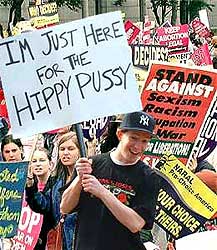Where Feminism Has Gone Wrong
Women have come a long way since the beginning of the twentieth century. When the Nineteenth Amendment was ratified in 1920, it prevented the federal and state governments from denying women the right to vote on the basis of gender. Over time, equal opportunity laws, anti-discrimination laws, and natural social and capitalist progression have allowed women to obtain higher education in greater numbers, penetrate the work force, and even attain major positions within companies such as those of board member, CEO, and even owner or majority shareholder. Ninety years ago, no woman–or man for that matter–would have believed that women would be where they are today in society. However, if you talk to many of the feminists out there, they make it sound as if no progress has been made at all, and they start throwing out terms such as “glass ceiling” and “rampant misogyny.” The fact of the matter is that women are getting closer to equality every day, as evidenced by the increase of women who obtain degrees in higher education, apply for jobs, and start their own businesses. Has equality been reached yet? No, not yet. There is still a slowly eroding social barrier, and it is something that cannot be forced. If anything, modern feminism has hurt the equality movement by sending the wrong message and having the wrong priorities. On the topic of feminism, women will tell me, “You don’t get it because you are not a woman.” No, I’m not, but I do know that unless feminists realize how they are perceived from the outside, they will not make any significant progress toward equality.
The big recent feminist firestorm came from the Hobby Lobby verdict. Feminists and some other women were holding up “Not My Boss’ Business” signs and talking about how sexist and backward it was that an employer could opt out of paying for their female employees’ oral contraceptives due to its religious beliefs. I understand that the rhetoric of the “religious right” is infuriating to a significant portion of the population, but technically, companies do not have to provide you with ANY additional benefits. Employee benefits were devised to attract the best job candidates away from competitors. Now, with Obamacare in place, companies with a certain number of employees either provide some sort of employee health insurance plan or pay a fine (or, as the SCOTUS ruled, a “tax”). However, if the provided health plan does not cover oral contraceptives, as a rational outsider, why should a company pay for it out of pocket if the company doesn’t believe in it? Even if it does believe in it, for that matter? There are hundreds, maybe thousands of medications that are not covered by many insurance plans. If I, as a man, have a condition that requires a medication not covered by insurance, I don’t expect my company to pay for it. I pay out of pocket, and I understand that is how it is. Expecting to have something paid for by an employer just because the employee has two X chromosomes sounds selfish and entitled rather than a demand for equality. It’s the employer’s money, it’s right, and there are many other medications the company will not cover. This wasn’t an attack on women, it was a company not wanting to pay out of pocket for an additional benefit. The Hobby Lobby verdict is an example of a fight that does not help the feminist cause for equality.
There is also the concept of the glass ceiling and wage inequality, where the 77 cents on the dollar statistic is debatable. It does not take into account the types of jobs, the hours worked per week, or the special privileges set in place for women, such as maternity leave or how women are more difficult to fire if a company has to downsize. There are a few truths to consider here. First, for many equal positions, two MEN within the SAME COMPANY may not even make the same amount annually. It could depend on a multitude of factors, such as seniority, performance, date of hire, region covered, or anything else that determines value. If you look at sites like glassdoor.com, you see that each position has a salary range, and the idea that women experience widespread wage discrimination doesn’t hold up, as there is no conclusive evidence that gender is the deciding factor in any difference in wages. Also consider that, currently, there are more male entrepreneurs and women are just beginning to penetrate the higher levels of businesses, where they do have more earning potential. What has really hurt women in this economic climate? The quality of jobs available, when they are available. Companies are generally running on skeleton crews, the labor force has shrunk, and most of the jobs created have been lower quality part-time or temporary jobs. With so many women graduating from college, how can they attain higher wages when demand is so low because the economy is shrinking? Not to mention, most of the current available jobs are in engineering, which is a field generally dominated by men.
Then there is the issue, of course, of abortion. Off the bat, I will say that I am pro-choice, and personally, I believe it is none of my business–or the government’s business–what a woman does with her body. The Republicans are morons for continuing to spout their traditional pro-life rhetoric, vowing to overturn Roe v. Wade and scaring away female voters. The truth of the matter is the Republicans could never have Roe v. Wade overturned, as it’s been proven there isn’t a constitutional argument in favor of the pro-life position. Also, the Republicans just won’t get enough states to agree to an anti-abortion constitutional amendment. It’s not going to happen. Still, is this a concern? It would be if I was a woman. However, nothing is going to be done anytime soon, and there are higher priorities before we focus on this issue, among the other social issues that concern women specifically.
So what’s the solution? What SHOULD feminists focus on? Well, if their goal is equality and they want the general population–including men–to join their cause, they need to focus on the big picture. I am a strong believer in the power of the economy. In a strong economy, companies will hire, higher quality jobs will be created, and it will be easier to create new businesses, which will help both men and women alike. As more women enter the workforce with skills that help them obtain better jobs, the social barrier will erode faster. More women will find themselves in leadership positions, and men will have to accept that. With that level of wealth creation, women will have more influence, money, and power to bring attention to the social policies that concern them. When less families live on welfare, the economy grows, and wealth gets created, we will be in a position to address these social issues properly and without distraction. Society will take successful women more seriously. I support equality, but if modern feminism does not approach it the proper way and focus on the big picture where the change can be made in a positive light rather than a self-victimizing, negative one, then no real, effective, positive progress will be made, and trolls will continue to tell women to shut up and get back in the kitchen.


There’s no way I’m reading that much about feminism.
12 years ago at 10:44 am
12 years ago at 10:48 amThat picture is fucking horrifying.
12 years ago at 10:51 amYou guys dun goofed on this article. Women are people, feminism is a great movement. What isnt a great movement are the rather extremist people (which every group has) who use feminism in the wrong way, saying that men are the entire problem and that women are inherently better (aka feminazis). I dont even like really using the term feminism, I think more people should start using the term humanism. All people should be treated equally, regardless of gender or race. People are people, if everyone just treated each other with respect our world would be a much better place.
12 years ago at 10:52 amSo it begins.
12 years ago at 10:59 am
12 years ago at 11:05 amThat was his point….
12 years ago at 11:07 amDid you even read the article or just read the title and then comment?
12 years ago at 11:11 amGreat job, Clockers. You’re gonna get a lot of harsh feedback from people who merely skimmed or read the title but overall, great work.
12 years ago at 10:53 amRead this as “cockers.”
12 years ago at 10:59 amhttp://www.youtube.com/watch?v=05ro6fcj6Ek
Feminism explained. Its pretty funny.
12 years ago at 10:56 amPrepare your inbox.
12 years ago at 10:57 amI wonder how many times Dorn’s mom has heard this phrase
12 years ago at 5:36 pmMost serious post ever on this site
12 years ago at 11:00 amintern, did you delete my comment? god save your soul, booking my flight now.
12 years ago at 11:04 amWoah, calm down a bit there buddy.
12 years ago at 11:24 amDrastically overreacting to subordinates mistakes. TFM
12 years ago at 3:52 pm5OClockShadow, putting out quality articles. Good work
12 years ago at 11:10 amQuickly becoming everyone’s favorite TFM writer.
12 years ago at 5:25 pm
12 years ago at 11:14 amWhat a guy
12 years ago at 2:10 pm